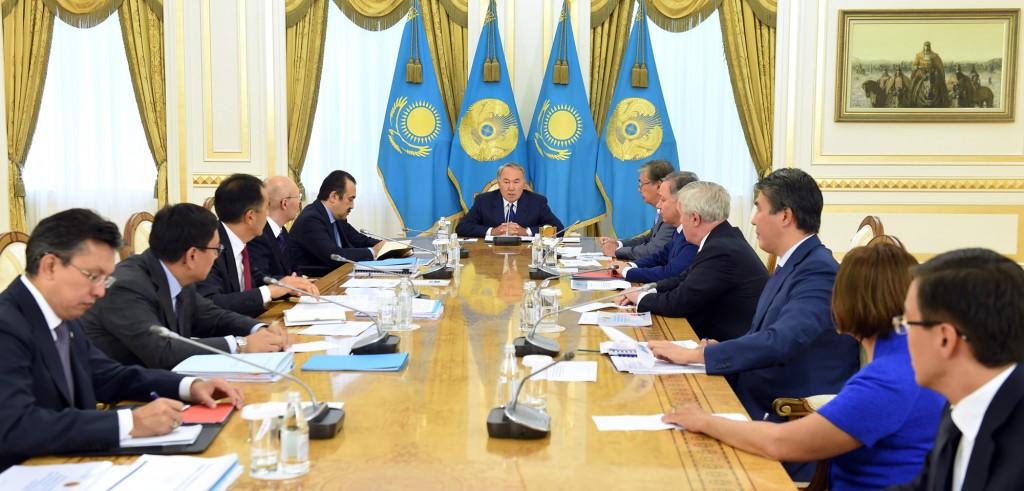ASTANA – President of Kazakhstan Nursultan Nazarbayev held a meeting with the government and other officials on Aug. 19 to discuss the economic policies and directions of the country’s economic growth in the context of worsening conditions on global markets, the Akorda press service reported.

President Nursultan Nazarbayev addresses government officials at an economic policy meeting on Aug. 19.
Nazarbayev instructed the government to prepare a plan of measures to promote economic growth in the medium term as soon as possible. The government and the National Bank were tasked to urgently work out economic and monetary policy measures appropriate to the current environment.
[Details of these plans were provided at a Central Communications Service briefing by Prime Minister Karim Massimov, National Bank Chair Kairat Kelimbetov and others on Aug. 20. A separate report will follow shortly.]
Nazarbayev highlighted a number of negative factors that could impact the economy of Kazakhstan in the long term.
“Firstly, according to experts, low prices for oil and metals might remain for five years. Secondly, access of developing countries to investments and capital will be significantly limited. Thirdly, the market for Kazakhstan’s products is shrinking due to the weak demand from our major partners, such as Russia and China,” he said.
Nazarbayev emphasised that under these circumstances the state must introduce a moratorium on various projects until 2018. He noted that it is necessary to adapt to a price of oil at the level of $30–40 per barrel.
“In previous years, we were building a lot, increased the number of personnel and salary levels. Now, however, there is a lack of funds and in this context the costs for new projects will be strictly limited by the opportunities of the revenue base. It is therefore necessary to establish a moratorium on various initiatives until 2018. This is a necessary measure due to today’s reality,” he announced.
The President instructed that the national budget deficit be reduced to 1 percent by 2018, noting that the funding of the deficit should be made only from internal reserves.
Also, Nazarbayev emphasised that the priority is to support key sectors of the economy that have a competitive advantage.
First Deputy Prime Minister Bakhytzhan Sagintayev reported that gross domestic product growth had slowed to 1.5 percent during the first seven months of 2015, due to the challenging situation in the world economy. The devaluation of the Russian rouble has created additional difficulties for the domestic food industry and agricultural producers.
“In this regard, funds in the amount of 6 billion tenge [US$30.63 million], which were previously aimed at the crop development, were reallocated to subsidies for the production of milk, meat, poultry, eggs, pork,” Sagintayev said.
“A total of 8.8 billion tenge [US$44.93 million] will be reallocated for the construction of the road Astana – Pavlodar – Oskemen. Another 6.6 billion tenge [US$33.7 million] will be reallocated for modernising housing and communal services,” he added.
Minister of Investment and Development Asset Issekeshev noted that in order to adapt industrial policy to new conditions, the focus will be shifted to the four most promising sectors out of 14. These are non-ferrous metals, fertilisers and agrochemical products, the petrochemical industry and the food industry.
Issekeshev drew attention to the decline in domestic demand for products from the machinery engineering, building materials, pharmaceuticals and light industry sectors.
“In this regard, we intend to support only the strongest companies, which have as partners either global companies or Kazakh companies so called champions. We see that the stronger enterprises continue to work, while the companies that did not modernise their productions will go bankrupt. It will be taken into account in our employment programme,” the minister said.
Minister of National Economy Yerbolat Dossayev informed that in the framework of ensuring macroeconomic stability, inflation is to be reduced to 3–4 percent by 2020, which will create a stable environment for investment.
In addition, he suggested the possibility of introducing a retail tax in order to improve retail and catering management.
Dossayev noted that the state plans to withdraw from small and medium-sized businesses through 2017.
Chairman of the National Bank Kairat Kelimbetov reported that the National Bank and the International Monetary Fund were studying the transition to inflation targeting. In his words, if the current situation persists, the implementation of the process will be hastened.
[Kelimbetov then announced the switch to inflation targeting in a live CCS briefing on Aug. 20, which led to the free floating of the tenge and trading at 255.26 per dollar in the morning session, up from 196 tenge per dollar one day prior.]
